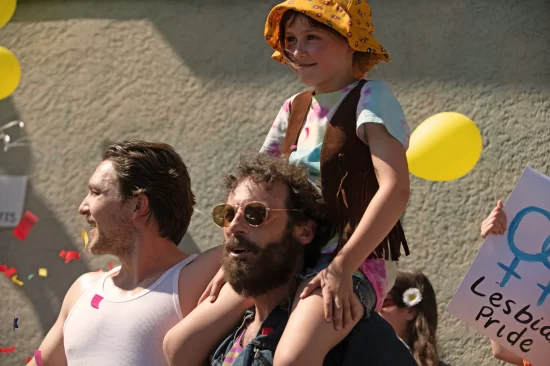Sundance London 2023 Review: Fairyland – “Touches on universal themes”
A tender and heartbreaking story, Fairyland was the perfect start of the Sundance London Film Festival as my first screening of this year’s edition of the festival. If sometimes we heard it said that it takes a village to raise a child, Fairyland reflects on raising a child as a single parent: maybe it takes a village or, maybe in this case, it takes a commute in San Francisco that is ready to welcome a child with open arms as she grows up in an unconventional home that is not any less of a home because of its unconventionality.
Based on Alysia Abbott’s memoir titled Fairyland: A Memoir of My Father, the movie is based on the very real experiences of Alysia herself and her father. Fairyland opens in 1973, following a young Alysia Abbott (Nessa Dougherty) as she moves to San Francisco with her father Steve Abbott (Scoot McNairy) after her mother’s death in a car accident. As the movie goes on, we get an insight into Alysia’s unconventional childhood as her father explores a bohemian lifestyle in a commune. As her father comes out as gay and she grows up, Alysia (Emilia Jones) discovers a world of poetry and artistry, but also of hardship as she is the one who now has to care for her father during the AIDS critics.
Fairyland spans many years of Alysia’s life, going from her early childhood to her first years as a young adult when her father’s illness forces her to grow up quicker than anyone else would have at her age. This allows the audience to witness the complexities of the relationship with her father as they grow in and out of their respective roles of father and daughter. By the end of the film, we feel close to the very characters we have seen grow up in front of us as both Alysia and her father feel like our close friends. As the audience gets an insight into every aspect of their lives, both Steve and his daughter are neither entirely positive nor entirely negative characters, making them all the more realistic and true.
What makes Fairyland such an interesting story is that it is mainly told through Alysia’s point of view. This almost seems like an obvious choice for this film as it is an adaptation of Alysia’s own memoir but the main character is the perfect introduction to her world with all its fleshed-out characters. As the film goes on, the audience discovers more details about her parent’s relationship and her father’s story and, eventually, AIDS just as Alysia herself finds out. In doing so, we see Alysia grow up from the very beginning, when she loses her mother, to the end as she faces the loss of another parental figure, thus perhaps even coming full circle.
However, the film also managed to go beyond Alysia’s personal story. Through Fairyland and its excellent costume design, the audience gets to jump right back to the past as the movie is historically situated by various references to significant historical moments, such as the California Proposition 6 and the death of Harvey Milk. As it is a film set during the 1970s and 1980, it also highlights the personal toll that historical events such as the AIDS epidemic or the fight for gay rights had on everyday people’s lives. This is particularly significant as it underlines the individual and emotional story within a larger context that some people in the audience will have only known of through history books rather than lived experience.
The way AIDS is worked into the story, but barely even mentioned, feels very organic and, while not necessarily unexpected, still heartbreaking when Fairyland eventually concludes Steve’s plot, thus making the movie’s final act its most powerful one. As the film draws to an end, the audience – and, therefore, Alysia – gets to see yet another side of Steve who becomes an even more layered figure thanks to McNairy’s stellar performance. As such, the film once again comes full circle as the roles between Alysia and Steve become reversed, reminiscing the beginning of the film.
Despite being a deeply personal film and one that depicts a unique and real experience, Fairyland is ultimately a universal film. This is not just because it is a movie we can immediately empathise with, but also because it touches on universal themes, such as the death of a parent, through Alysia’s eyes. Despite its sad story, there is some comfort in knowing Fairyland can exist as it did to some level for Steve Abbott. Fairyland shows that everyone can have their own fairyland, a place where everyone can truly be themselves, in whatever unconditional form that may take for each of us.










